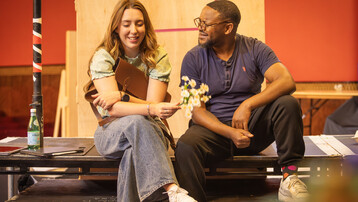News Story
Britten’s 1947 song cycle written for contralto Nancy Evans, A Charm of Lullabies, has long been a recital hall favourite. I expect that is because, in the context of his other song cycles, it is relatively easy on the ear. The title, too, suggests something pleasant, soothing, and, frankly, sentimental. It conjures up nurseries in the days of dedicated servants, whose own domestic lives were irrelevant.
Characteristically, Britten upends such expectation. He chose seven poems from an anthology of lullabies that is now held in the archives at Snape, and later trimmed that to five. A number of the texts are on the scary side, and not one is what you’d call sentimental.
The Cradle Song of poet, painter and prophet William Blake (1757–1827) testifies not only to the smiles, joys and beauties on infancy, but more insistently to “soft desires”, “cunning wiles”, “little sorrows” and “dreadful lightnings”. This lullaby singer knows innocence and experience are one life, viewed from two perspectives — and there is a strong sense that the singer longs for rest herself, which the infant’s liveliness prevents. Although Blake had no children of his own, he was the third of seven children of a hosier, largely home-schooled by his mother, so he had an intense experience of family life.
The Highland Balou of Robert Burns (1759–1796) is an altogether heartier affair, and scarcely conducive to sleep. It seems more like a villain’s blessing, wishing on the baby a successful career as a horse thief, profiting highland rogues by harrying the lowland fools. It is well matched in energy by the central piece, called Sephestia’s Lullaby, taken from the prose poem Menaphon by Robert Greene (1558–1592). Greene was a popular pamphleteer, novelist and playwright, a graduate of Cambridge and a celebrated scapegrace; by his own account he married a well-heeled woman, spent her dowry, and abandoned her when she gave birth to his child; by the accounts of others he kept a mistress who was the sister of a notorious gangster at Shoreditch, and abandoned her and their child, called Fortunatus (or Happy). It seems at least likely he had little softness toward infants.
This lullaby is the most complex of the five, and the only one with a narrative; the singer of the lullaby tries to quiet a child she did not want, though the father did, at least at first. Then the father left, and she was left with the “wanton”, who she warns “When thou art old, there’s grief enough for thee”. It reminded me of a highly effective childhood warning from my own kind mother, who had five children before me: “Stop crying or I’ll give you something to cry for”.
A Charm, by Thomas Randolph (1605–1639) is an extended and elaborate threat, extended in this song from the hypothetical child to the audience. “Quiet, sleep!” we are warned, or all the hounds and furies of hell will be set loose on us, and every sort of malady afflict us. We are far from the repetitive, tuneful softness of what we normally think of as lullabies, and in the world of the charm, or spell! It is a particular thing, isn’t it — a song that is sung in order to achieve (or enforce) silence? Perhaps with his ten siblings and half siblings knew about noisy houses; he seems to have avoided having children of his own.
The haunting Nurse’s Song, setting a poem taken from Elizabethan dramatist John Philip’s The Play of Patient Grisell, is much treasured by British mezzo sopranos. It is hard to imagine anything more lonely, or more poignant (except perhaps the final setting of Pushkin in the same composer’s A Poet’s Echo!). It calls to mind the exhaustion of those attending infants in the middle of the night, the insecurities and premonitions of early morning hours, the costs that accompany the pleasures of care.
I confess that my idea for staging this song cycle came from a dream that was succeeded by sleepless imaginings. I thought about a person who wanted, very much — wanted silence, wanted attention, wanted rest — and sang to exact it, but found that solitary dominion not quite what she anticipated.
To charm is to chant a verse with magic powers. From the time of the first Queen Elizabeth, a charm is “a blended noise, as of birds, school-children, etc”; in Paradise Lost, Milton refers to the morning “rising sweet with charm of earliest birds”.




